Please note: this event has passed
Challenges facing Central Banks in the 2020s
The conference will focus on new directions in central bank research and policymaking. Discussion points include:
- Central bank mandates, policy frameworks and governance arrangements,
- Understanding the interaction of fiscal, monetary and macroprudential policies,
- Understanding new and emerging threats to economic stability, including COVID, climate change and new financial technologies,
- Conducting monetary and macroprudential policies in times of uncertainty,
- Data analytics for central banking.
Register to attend by clicking here
Conference Programme
Day 1: Monday 17 May 2021
9.45 – 10.00 - Welcome & Introductions
10.00 – 10.45 - Keynote Address
The Future of Monetary Policy: Lessons from the European Monetary Union
Professor Lucrezia Reichlin (London Business School and Director General of Research at the European Central Bank 2005 - 2008)
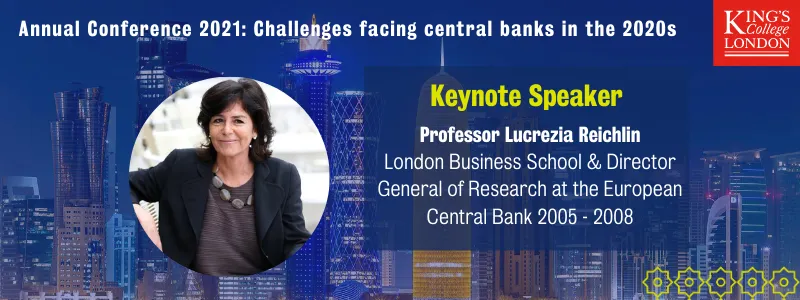
11.00 – 12.30 - Session 1: COVID-19 and the Macroeconomy
“Aggregate-Demand Amplification of Supply Disruptions: The Entry-Exit Multiplier”
by Florin Bilbiie (University of Lausanne) and Marc Melitz
Discussant: Andrea Ferrero (University of Oxford)
This session will focus on the amplification of aggregate demand to supply shocks, highlighting key differences that can potentially resolve observed discrepancies associated with the workhorse new-Keynesian model.
The response of entry and exit to adverse supply shocks, such as COVID-19, is amplified by nominal rigidities, leading to further amplification in aggregate demand. Firms' inability to adjust their prices induces further changes in profitability that generate additional entry-exit dynamics. These changes in net entry, in turn, amplify the initial response to the shock by generating additional curvature in the relationship between the shock and aggregate demand.
“The Transmission of Keynesian Supply Shocks”
by Ambrogio Cesa-Bianchi (Bank of England) and Andrea Ferrero
Discussant: Ivan Petrella (Warwick Business School)
Sectoral supply shocks can trigger shortages in aggregate demand when strong sectoral complementarities are at play. U.S. data on sectoral output and prices offer support to this notion of "Keynesian supply shocks" and their underlying transmission mechanism. Demand shocks derived from standard identification schemes using aggregate data can result from sectoral supply shocks that spill over to other sectors via a Keynesian supply mechanism. This finding is not only a feature of the COVID-19 episode but a regular feature of the data in general. Understanding the origins of business cycle fluctuations requires breaking the dichotomy between aggregate demand and supply disturbances.
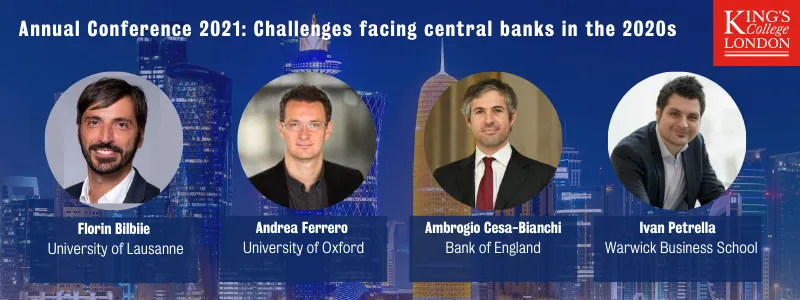
13.00 – 14.30 - Session 2: Monetary Policy Frameworks
“Why So Negative? The Effect of Monetary Policy on Bank Credit Supply across the Euro Area”
by Florian Heider (European Central Bank), Christian Bittner, Diana Bonfim, Farzad Saidi, Glenn Schepens and Carla Soares
Discussant: Skander van den Heuvel (Board of Governors of the Federal Reserve)
This session will discuss different modes of monetary-policy transmission via banks' supply of credit to firms in the euro area utilising a unique combination of confidential credit-registry data from Germany and Portugal.
In the wake of the sovereign debt crisis, deposit rates vary substantially across the euro area, impacting the degree to which monetary policy can stimulate bank lending. When exploiting the introduction of negative monetary-policy rates in the euro area, it has been found that when lower, negative policy rates do not translate into lower deposit rates, as is the case in Germany but not in Portugal, standard channels of monetary-policy transmissions, such as the bank-capital channel, are dominated by the effect on high-deposit banks' cost of funding.
“Reversal Interest Rate and Macroprudential Policy”
by Matthias Rottner (European University Institute), Matthieu Darracq Pariès and Christoffer Kok
Discussant: Kristina Bluwstein (Bank of England)
The prolonged period of ultra-low interest rates in the euro area and other advanced economies has raised concerns that further monetary policy accommodation could entail the opposite effect than what is intended. Specifically, there is a risk that a further monetary policy loosening might have contractionary effects for very low policy rates. The policy rate enters a "reversal interest rate" territory, in which the usual monetary transmission mechanism through the banking sector breaks down. This session will investigate the reversal interest rate and macroprudential policy.
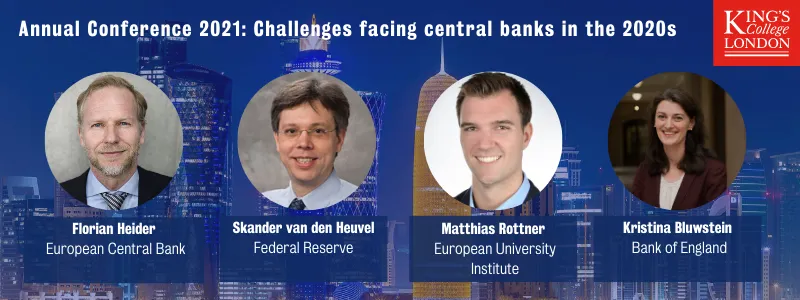
14.45 – 16.15 - Session 3: Negative Interest Rate Policy
“Hitting the Elusive Inflation Target”
by Leonardo Melosi (Federal Reserve Bank of Chicago), Francesco Bianchi and Matthias Rottner
Discussant: Jenny Chan (Bank of England)
Since the 2001 recession, average core inflation has been below the Federal Reserve's 2% target. This deflationary bias is a predictable consequence of the current symmetric monetary policy strategy that fails to recognise the risk of encountering the zero-lower-bound. An asymmetric rule according to which the central bank responds less aggressively to inflation corrects the bias, improving welfare, and reducing the risk of deflationary spirals (a pathological situation in which inflation keeps falling indefinitely). This approach does not entail any history dependence or commitment to overshoot the inflation target and can be implemented with an asymmetric target range.
“Falling Natural Rates, Rising Housing Volatility and the Optimal Inflation Target”
by Oliver Pfäuti (University of Mannheim), Klaus Adam and and Timo Reinelt
Discussant: Caterina Mendicino (European Central Bank)
The decline in natural interest rates in advanced economies has been accompanied by a significant increase in the volatility of housing prices over the past decades. The monetary policy implications of these macroeconomic trends depend on the source of increased housing price volatility (in the presence of a lower-bound constraint on nominal rates). If housing price expectations are rational, increased housing price volatility reflects more volatile housing demand shocks. The Ramsey optimal inflation target then increases only minimally as average natural rates fall. Instead, if housing price volatility is partly due to speculative housing price beliefs, as suggested by survey data, then lower natural rates endogenously trigger larger fluctuations in belief-driven housing price fluctuations. This causes the volatility of the natural rate to increase and exacerbates the lower-bound problem. As a result, the Ramsey optimal inflation target rises much more strongly as the natural rate falls.
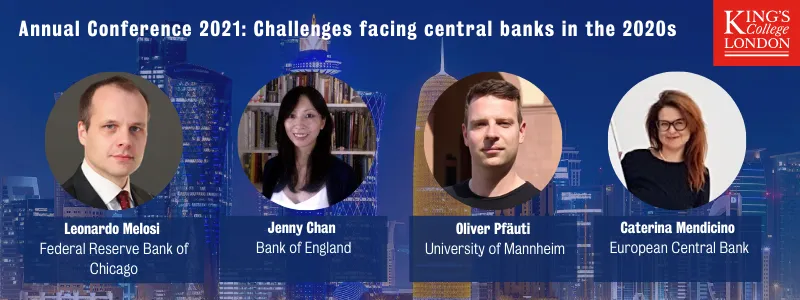
16.30 – 17.30 - Panel: What Next for Monetary Policy?
Chair: Tobias Adrian (International Monetary Fund)
Panel: Argia Sbordone (Federal Reserve Bank of New York), Frank Smets (European Central Bank) and Gertjan Vlieghe (Bank of England)
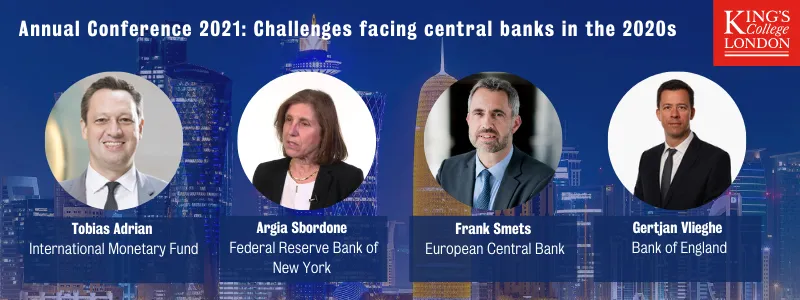
Day 2: Tuesday 18 May 2021
9.45 – 10.00 - Welcome & Introductions
10.00 – 10.45 - Keynote Address
The relationship between HM Treasury and the Bank of England: the search for credibility
Lord Macpherson of Earls Court (Permanent Secretary to the Treasury, 2005-2016)
The relationship between the finance ministry and the central bank is central to successful economic policymaking. Drawing on 25 years of working closely with the Bank of England, Nick Macpherson will examine how the relationship between the Treasury and the Bank of England has evolved; whether it is optimal; and what are the risks to it in a world where Quantitative Easing has become endemic.
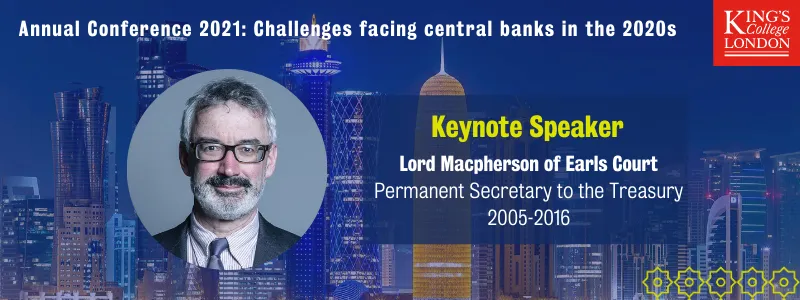
11.00 – 12.30 - Session 4: Central Bank Decision-Making and Communication
“Financial Stability Governance and Central Bank Communications”
by Juan M. Londono (Board of Governors of the Federal Reserve), Stijn Claessens and Ricardo Correa
Discussant: Stephen Hansen (Imperial College Business School)
This session will explore how central banks conduct their communication strategy, which eventually plays a role in the evolution of the financial cycle. Evidence finds that communications by central banks participating in an inter-agency financial stability committee are relatively more effective at alleviating financial conditions deterioration and preventing potential financial stability events. Furthermore, after observing a deterioration of financial conditions, central banks participating in financial stability committees transmit a calmer message, given observed financial variables and sentiment in news articles, than banks without these characteristics, among other things, because they can implement policy tools other than communication.
“Voting Right Rotation and the Behaviour of Committee Members – a Case Study of the U.S. Federal Open Market Committee”
by Michael Ehrmann (European Central Bank), Robin Tietz and Bauke Visser
Discussant: Michael MacMahon (University of Oxford)
Federal Reserve Bank presidents have the right to vote on the U.S. monetary policy committee on a mechanical, yearly rotation scheme. Rotation is without exclusion, and non-voting presidents customarily attend and participate in the meetings of the committee. This session will explore the effects of voting status on committee behaviour.
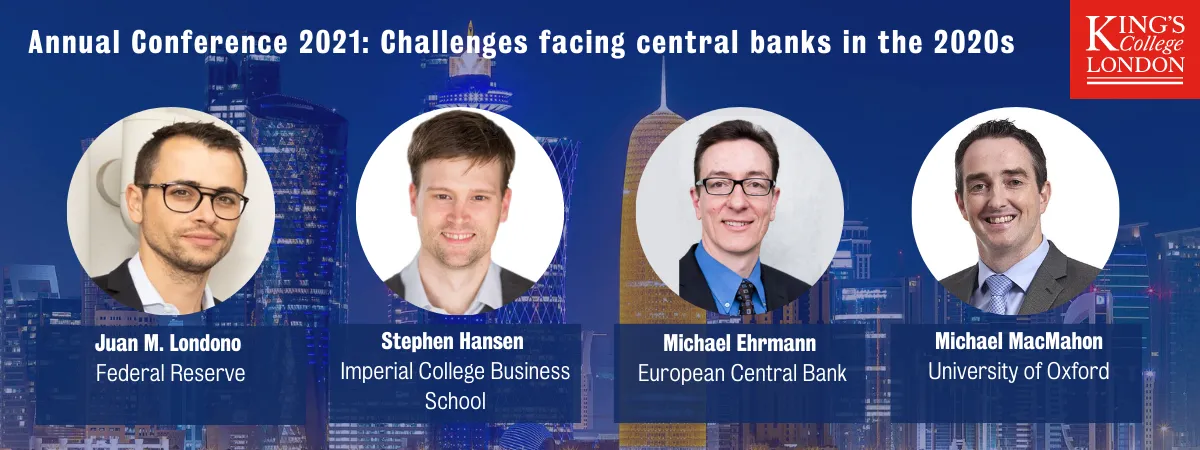
13.00 – 14.30 - Session 5: Shadow Banking and Capital Flows
“Central Banking and Shadow Banks”
by Quentin Vandeweyer (Chicago Booth), Adrien d'Avernas and Matthieu Darracq Paries
Discussant: Roland Meeks (International Monetary Fund)
This session will explore how the presence of shadow banks affects the ability of central banks to offset a liquidity crisis, utilising an asset pricing model with heterogeneous banks subject to funding risk.
“How Does International Capital Flow?”
by Andrej Sokol (European Central Bank), Michael Kumhof and Phurichai Rungcharoenkitkul
Discussant: Genevieve Nelson (Danmarks National Bank)
Understanding gross capital flows is crucial for both macroeconomic and financial stability policy. However, theory lags behind empirical work. This session will look at a new model developed featuring gross capital flows and a fresh perspective on important policy debates, such as the role of current accounts as indicators of financial fragility, the nature of the global saving glut, Triffin's current account dilemma, and the synchronisation of gross capital inflows and outflows.

14.45 – 16.15 - Session 6: Climate Risk and The Financial System
“Climate Actions and Stranded Assets: The Role of Financial Regulation and Monetary Policy”
by Francesca Diluiso (MCC), Barbara Annicchiarico,Matthias Kalkuhl and Jan C. Minx
Discussant: Rick Van der Ploeg (University of Oxford)
Limiting global warming to well below 2◦C may result in the stranding of carbon-sensitive assets, posing potential threats to financial and macroeconomic stability. This session will view a dynamic stochastic general equilibrium model with financial frictions and climate policy to study the possible perils of a low-carbon transition and to evaluate the role of financial regulation and monetary policy.
“On the Dependence of Investor’s Probability of Default on Climate Transition Scenarios”
by Irene Monasterolo (Vienna University of Economics and Business) and Stefano Battiston
Discussant: Paul Hiebert (European Central Bank)
Climate risk brings about a new type of financial risk that standard approaches to risk management cannot handle. Amidst the growing concern about climate change, financial supervisors and risk managers are concerned with the risk of a disorderly low-carbon transition.
This session will explore a model developed to compute: the valuation adjustment of corporate bonds (depending on both climate transition risk scenarios and companies' shares of revenues across low/high-carbon activities), and the corresponding adjustments of an investor's Expected Shortfall and probability of default.
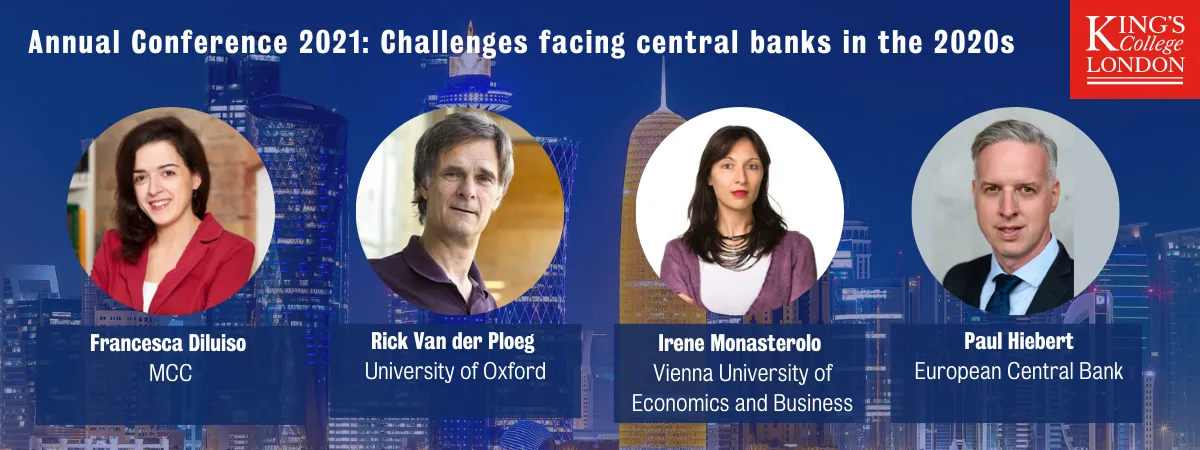
16.30 – 17.30 - Panel: What Next for Financial Stability?
Chair: Nicolas Véron (Bruegel and the Peterson Institute)
Panel: Vitor Constancio (University of Navarra), Donald Kohn (Brookings Institution) Carolyn Rogers (Basel Committee on Banking Supervision)

17.30 – 18.00 - Young Economist Prize Giving Event
The Young Economist prize is an award hosted by the Qatar Centre for Global Banking open to PhD students of all nationalities, currently enrolled on a programme in Economics or Finance. The winner of the award will be announced along with an overview of other shortlisted papers based on the Conference topic of ‘Challenges facing Central Banks in the 2020s’.
Register to attend the event here
About the Centre
The Qatar Centre for Global Banking and Finance is a research centre dedicated to the study of central banks and the challenges they face in the global environment. It aims to develop cutting-edge research in all areas of central bank policymaking, ranging from monetary policy to financial stability and regulation.
About the speakers
Lucrezia Reichlin is a Professor of Economics at the London Business School. She is the non-executive director of AGEAS Insurance Group and sits on the Board of Morgan Stanley International and its German subsidiary. Lucrezia is also Chair of European Corporate Governance Institute and a Trustee of IFRS. She is a columnist for the Italian national daily Il Corriere della Sera and a regular contributor of Project Syndicate.
Nick Macpherson (Lord Macpherson of Earl’s Court GCB) was Permanent Secretary to the Treasury from 2005-16, serving three Chancellors and leading the department through the banking and wider economic crisis of 2007-9. Nick joined the Treasury as an economist in 1985, after studying economics at Balliol College, Oxford, and University College, London, and was Principal Private Secretary to Ken Clarke and Gordon Brown in the 1990s. He is now a Visiting Professor at King’s College, London, Chairman of C Hoare & Co and sits as a cross-bench peer in the House of Lords.
Florin Bilbiie is a Professor of Economics at the University of Lausanne and Research Fellow of the CEPR. Between 2010 and 2018, he was a Professor at the Paris School of Economics and Université Paris 1 Panthéon-Sorbonne and Scientific Director of Chair Banque de France, after previously holding positions at Oxford University (Nuffield College) and HEC Paris. He has held visiting positions with several central banks (NY Fed, Chicago Fed, ECB, Bank of England, Riksbank, etc.), the National Bureau of Economic Research, New York University (in both NYC and Abu Dhabi) and CREi Barcelona.
Andrea Ferrero is a Professor of Economics at the University of Oxford and the Levine Fellow in Economics at Trinity College Oxford. He holds a BA in Economics from Bocconi University, an MSc in Economics from Universitat Pompeu Fabra, and a PhD in Economics from New York University. He is currently an academic consultant for the Bank of England and was a consultant the Norges Bank between 2014 and 2016.
Ambrogio Cesa-Bianchi is a Senior Economist at the Bank of England's International Directorate. He has broad expertise in econometric and general equilibrium (DSGE) modelling, and his research interests include international economics and finance, monetary policy, and housing. Ambrogio received his PhD in Economics from Cattolica University (Milano); he also holds an MSc in Economics from Pompeu Fabra University and a 5-year degree in Engineering from Politecnico di Milano.
Ivan Petrella is an Associate Professor in Economic Modelling and Forecasting at Warwick Business School, University of Warwick. He is also a CEPR Research Affiliate.
Florian Heider leads the Financial Markets Research Section (within the Financial Research Division) at the European Central Bank. He is also a Research Fellow in the Financial Economics Programme of the CEPR, and an associate editor of the Journal of Financial Intermediation.
Skander van den Heuvel is a Deputy Associate Director in the Division of Financial Stability of the Federal Reserve Board. Before joining the Federal Reserve in 2008, Skander was an Assistant Professor in the Finance Department of the Wharton School of the University of Pennsylvania. He has also served as an Adviser in the European Central Bank’s Research department and he is a Fellow of the Wharton Financial Institutions Center.
Matthias Rottner is a consultant at the European Central Bank and a PhD Candidate in Economics at the European University Institute (EUI).
Kristina Bluwstein is a Research Economist in the Macroprudential Strategy and Support Division at the Bank of England. She completed her PhD in Economics at the European University Institute.
Leonardo Melosi is a senior economist in the economic research department at the Federal Reserve Bank of Chicago. In that position, he conducts research and analysis on macroeconomics and applied econometrics.
Jenny Chan is a Research Economist in the Monetary Strategy Team at the Bank of England and a member of the Centre for Macroeconomics. She received her PhD in Economics from Universitat Pompeu Fabra in 2019. Her research interests include macroeconomics, monetary policy, and information friction.
Oliver Pfäuti is a PhD Student in Economics at the University of Mannheim. He obtained his bachelor’s degree in Economics from the University of Bern. He then earned a master’s degree in International and Monetary Economics at the Universities of Bern and Basel. In his master’s thesis, he examined the distributional consequences of unconventional monetary policy at the zero lower bound.
Caterina Mendicino is a Senior Lead Economist in the Monetary Policy Research Division (DG-Research) of the European Central Bank. She is interested in quantitative and empirical research in monetary and financial economics, with a particular focus on the real and financial stability effects of central bank policies and the interaction between monetary and macroprudential policies.
Tobias Adrian is the Financial Counsellor and Director of the IMF's Monetary and Capital Markets Department. Prior to joining the IMF, he was a Senior Vice President of the Federal Reserve Bank of New York, and the Associate Director of the Research and Statistics Group.
Argia Sbordone is a Vice President and Function Head in the Macroeconomic and Monetary Studies Function of the Federal Reserve Bank of New York. Her research is in the field of macro and monetary economics, with a focus on the analysis of business cycle fluctuations.
Frank Smets is Director General of the Directorate General Research of the European Central Bank. He is a Professor of international economics at the Centre for Economic Studies at the KU Leuven and an honorary professor in the Duisenberg chair at the Faculty of Economics and Business of the University of Groningen.
Gertjan Vlieghe is a member of the Monetary Policy Committee at the Bank of England. Prior to his appointment, he had been a partner and senior economist at Brevan Howard Asset Management, researching global macroeconomic trends and their interaction with asset prices. From 2005 to 2007 he was a bond strategist at Deutsche Bank. From 1998 to 2005 he held a number of posts at the Bank of England, including the post of Economic Assistant to Governor Mervyn King.
Juan M. Londono is a Senior Economic Project Manager at the Federal Reserve Board. He has a PhD in Business (Finance) from Tilburg University and in Quantitative Finance from the Basque Country University. His research interests include asset and derivative pricing, contagion and international transmission of shocks, uncertainty, text analysis, and financial stability.
Stephen Hansen is an Associate Professor of Economics at Imperial College Business School. His research focuses on organizational economics and monetary policy and he draws on unstructured data sources and machine learning methods to address questions in these areas.
Michael Ehrmann is Head of the Monetary Policy Research Division in the European Central Bank's Directorate-General Research and CEPR Research Fellow. Previously, he worked as Director in the International Department and as Head of Research at the Bank of Canada and held various positions at the ECB, including Head of the Financial Research Division.
Michael McMahon is a Professor of Economics at the University of Oxford and Senior Research Fellow at St Hugh’s College. He previously worked at Warwick University and has also given courses at INSEAD, NYU, Chicago Booth, LBS and LSE. He has delivered capacity building courses throughout Asia with the IMF’s Singapore Training Institute. He worked at the Bank of England for many years. Since April 2019, he serves as a member of the Irish Fiscal Advisory Council.
Quentin Vandeweyer is an Assistant Professor of Finance at Chicago Booth. He holds a PhD in economics from Sciences Po Paris and an MSc in economics from Ecole Polytechnique. In 2020, he received the AQR Top Graduate Award at CBS. Prior to joining Booth, he worked in the Research Directorate of the European Central Bank. In 2017-18, he was an awardee of the Becker Friedman Institute’s MFM / Macro Financial Modeling Project.
Roland Meeks is a Senior Financial Sector Expert in the Monetary and Capital Markets Department at the International Monetary Fund and a research associate at CAMA.
Andrej Sokol is a Senior Research Economist in the Global Analysis Division, International Directorate at the Bank of England. He is currently seconded to the European Central Bank. Andrej's research interests include international finance, monetary economics, empirical macroeconomics and forecasting. Andrej is also involved in model building for scenario analysis, nowcasting and forecasting.
Genevieve Nelson is a postdoctoral economist in the Research Unit of Danmarks National bank (the Danish Central Bank). She has a PhD in Economics from the University of Oxford. Her research interests are in macroeconomics, macro-finance, macroprudential policy and monetary policy.
Francesca Diluiso is a Postdoctoral Researcher at the Mercator Research Institute on Global Commons and Climate Change (MCC), in Berlin. She received her BA from University La Sapienza and her MA and PhD in Economics from the University of Rome Tor Vergata. Before joining MCC, she worked at Fondazione Eni Enrico Mattei (FEEM) and at the Joint Research Centre of the European Commission. Her research activity mainly focuses on the study of environmental regulation at business cycle frequency and on the interaction between monetary, fiscal, and climate policy in a context dominated by short-run uncertainty.
Rick Van der Ploeg is a Professor of Economics and Research Director of the Oxford Centre for the Analysis of Resource Rich Economies at Oxford University, and a Senior Research Fellow of New College. He is an Adjunct Professor at the University of Amsterdam and a research fellow at CEPR, CESifo and the Tinbergen Institute.
Irene Monasterolo is an Assistant Professor of Climate Economics and Finance at the Institute for Ecological Economics, Vienna University of Economics and Business. Irene holds a PhD in Agri-food Economics and Statistics from the University of Bologna, and two post-doctoral specializations in Cambridge (UK) and Boston (USA).
Paul Hiebert is Head of Systemic Risk and the Financial Institutions Division at the European Central Bank. His career has spanned various macroeconomic, financial and policy roles at the ECB, Reserve Bank of Australia and the Canadian Department of Finance. During this time, he has published empirical work on a wide variety of topics – ranging from financial cycles and housing markets to fiscal policy and international trade.
Nicolas Véron is a senior fellow at Bruegel and at the Peterson Institute for International Economics in Washington, DC. He was a co-founder of Bruegel starting in 2002, initially focusing on Bruegel’s design, operational start-up and development, then on policy research since 2006-07. He joined the Peterson Institute in 2009 and divides his time between the US and Europe.
Vitor Constancio is a Professor at the School of Economics & Business Administration of the University of Navarra. He is also President of the Council ISEG - Lisbon School of Economics and Management, University of Lisbon, where he taught for many years. From June 2010 to May 2018, he served as Vice-President of the European Central Bank. He was Governor of the Banco de Portugal from 2000-2010. He graduated in Economics from the Universidade Técnica de Lisboa.
Donald Kohn holds the Robert V. Roosa Chair in International Economics and is a senior fellow in the Economic Studies program at the Brookings Institution. He is a former external member of the Financial Policy Committee at the Bank of England and a 40-year veteran of the Federal Reserve System, serving as a member and then vice-chair of the Board of Governors from 2002-2010.
Carolyn Rogers is the Secretary General for the Basel Committee for Banking Supervision. In this capacity, she also serves as the Chair of the Committee's Policy Development Group. She has 20 years of executive management experience in the financial services industry, having worked in both the public and the private sector. She was Assistant Superintendent of Regulation at the Office of the Superintendent of Financial Institutions (OSFI) in Canada and served as OSFI's representative on the Basel Committee.
